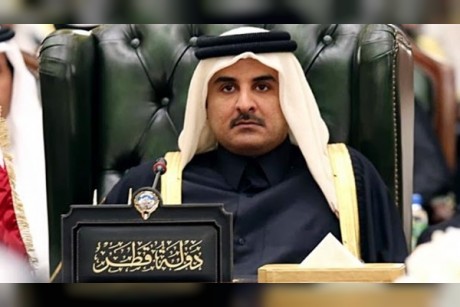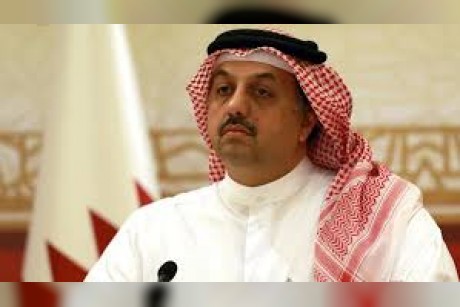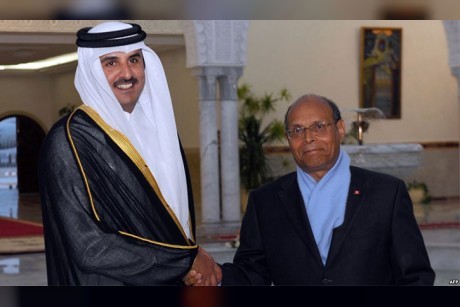Qatar remains inexcusably negligent in its efforts to halt terror finance, lacking the political will to punish terror financiers that have operated in its territory, according to a report issued today by the Foundation for Defense of Democracies (FDD). The report, “Qatar and Terror Finance (Part II): Private Funders of al-Qaeda in Syria,” is the second of a three-part series on Qatar’s troubling record.
Al-Qaeda in Syria is the global jihadist group’s largest branch in history. The U.S. government confirmed in November that despite the Nusra Front’s name change, it remains al-Qaeda’s Syrian franchise. It is still plotting attacks against the West.
Doha has not taken visible legal action against any of the group’s Qatar-based financiers, even though they are under United States and United Nations sanctions, writes the report’s author, FDD Senior Fellow David Andrew Weinberg. By irresponsibly neglecting this problem, Qatar is undermining international security by appearing to let egregious acts of terror finance go unpunished.
Weinberg documents five cases of individuals who were based out of Qatar and accused of illicit finance. All of them were sanctioned by the U.S. Treasury Department in late 2014 or 2015 on charges of funding terror. These sanctions were imposed after Qatar agreed in September 2014 to the Jeddah Communiqué, a U.S.-led initiative in which Doha pledged to bring terror financiers to justice. Qatar has yet to show it has taken legal action to punish even just one of these five men, either in person or in absentia. The five are: Ashraf ‘Abd al-Salam, ‘Abd al-Malik ‘Abd al-Salam, Ibrahim al-Bakr, Sa’d bin Sa’d al-Ka’bi, and ‘Abd al-Latif al-Kawari.
“When it comes to supporting the United States by clearly going after terrorist financiers, Qatar is not a good ally,” Weinberg said. “Qatar has gotten by with half measures and handled the fallout like a public relations nuisance, paying spin doctors and lobbyists to press its interests in Washington instead, increasing its spending in this area tenfold.”
Weinberg recommends Congress take steps that would empower the executive branch to punish foreign governments that refuse to consistently crack down on terror finance and its practitioners.
He also recommends the United States boost its leverage by shifting some personnel and equipment out of Qatar and building an alternative Combined Air and Space Operations Center outside of the tiny Gulf country.
Finally, Weinberg recommends the U.S. increase the pace of designations against Qatar-based terrorist financial facilitators and be prepared to publicly push for the extradition of key individuals on U.S. or U.N. sanctions lists if Qatari authorities fail to take appropriate action.
During a major address on terrorism in August, “President-elect Trump promised to ‘decimate al-Qaeda,’ but achieving that goal will be impossible without choking off the funding of al-Qaeda’s most powerful branch, which has continued to flow out of Qatar,” Weinberg said.
Back in 2014, the American official in charge of terror sanctions has revealed that two senior al-Qaeda money men have escaped punishment in the Gulf state, as reported by The Telegraph.
Two of al-Qaeda’s most senior financiers are living with impunity in Qatar despite being on a worldwide terrorism blacklist, the American official in charge of sanctions has disclosed.
The revelation casts serious doubt on the Gulf state’s insistence that it does not support terrorists, including jihadists in Syria and Iraq.
It will also add to growing calls on the British Government to put pressure on Qatar to crack down on terrorist financiers following the murder of two British aid workers in Syria.
Qatar has huge investments in Britain — including such landmark businesses as the Shard skyscraper — and yet at the same time is apparently condoning jihadist financiers operating out of the Gulf.
The two Qataris — Khalifa Muhammad Turki al-Subaiy and Abd al-Rahman bin Umayr al-Nuaymi — are living in Doha, the country’s capital, and are free to go as they please, according to David Cohen, the US Treasury under-secretary for terrorism and financial intelligence.
Mr Cohen has accused Qatar and its near neighbour Kuwait of being “permissive jurisdictions for terrorist financing” but until now the fate of a number of money men — identified as Specially Designated Global Terrorists by the US government — has not been known.
Qatar has refused to say what has happened to al-Subaiy, al-Nuaymi and others on US and United Nations terrorism sanctions lists.
The Telegraph has asked over a number of weeks about the status of the men and Qatar has refused to answer. But during a question and answer session following a keynote speech in Washington, a transcript of which has been obtained by The Telegraph, Mr Cohen said: “There are US- and UN-designated terrorist financiers in Qatar that have not been acted against under Qatari law. There’s Khalifa al-Subaiy — and more recently, Abd al-Nuaymi, who we designated last December, the UN designated in August.” Mr Cohen added that both men were residents in Qatar.
The US Treasury said it could not disclose further classified information on the men.
Both al-Nuaymi and al-Subaiy are understood to be well-connected to Qatar’s ruling elite.
They are also accused of raising millions of dollars for al-Qaeda and other jihadist groups. Al-Qaeda and Islamic State of Iraq and the Levant (Isil) have announced a deal to fight together in Iraq and in Syria.
Al-Subaiy, 49, a former Qatari Central Bank employee, was blacklisted as a terrorist fundraiser as long ago as 2008 but still appears to be heavily involved in a jihadist network.
According to the official American report, al-Subaiy was identified as “a Qatar-based terrorist financier and facilitator who has provided financial support to, and acted on behalf of, al-Qaeda senior leadership, including senior al-Qaeda leader Khalid Sheikh Mohammed (KSM) prior to KSM’s capture in March 2003”.
Khalid Sheikh Mohammed has been named as the “principal architect of the 9/11 attacks” and is being held in Guantánamo Bay.
He had lived freely in Qatar for a number of years in the Nineties despite being wanted even at that stage by the US for terror offences.
Al-Nuaymi, a former president of the Qatar Football Association, is accused of being one of the world’s most prolific terrorist fundraisers, accused of sending more than £1.25 million a month to al-Qaeda jihadists in Iraq and hundreds of thousands of pounds to Syria.
He was designated a terrorist in the US last December and added to a British sanctions list only in October this year.
It is alleged that both men’s links to senior figures in Qatar has helped keep them out of jail in recent years and off Qatar’s own terrorist sanctions list. The country introduced a designated terrorist list but to date not a single individual has been put on it.
A US diplomatic cable sent in May 2008 hinted at a dispute between the Qatari intelligence agencies and the country’s then all-powerful prime minister Hamad bin Jassim bin Jaber al-Thani — known as HBJ for short — over the handling of al-Subaiy, who at the time was serving time in jail after being convicted of terrorist offences in Bahrain.
In the cable sent by the US’s then chargé d’affaires Michael Ratney, ahead of a visit by Henry Paulson, the treasury secretary at the time, he wrote: “HBJ was involved very early on, but to the consternation, we believe, of Qatar’s security agencies.
“If you raise the issue on this visit, it should be limited to thanking the Qataris for their cooperation on the case … “We believe any more detailed discussion of the case should be done through the Qatari attorney general and intelligence service, and not with HBJ.”
Al-Nuaymi, 60, was, according to reports a decade ago, praised by Qatar’s former emir who thanked him for introducing the emir to “men of Islamist political thought” including a sheikh who has been described as a mentor to Osama bin Laden.
The Telegraph’s Stop the Funding of Terror campaign, has highlighted how Gulf states — including Qatar — have turned a blind eye to terrorist financiers operating within their midst.
The US treasury believes countries such as Saudi Arabia and United Arab Emirates have clamped down on jihadist financiers in recent months whereas Qatar and Kuwait have failed to tackle the issue — much to the frustration of Washington.
The US has attempted to keep Qatar at arm’s length. It is wary about the Qatari government’s overt support for Hamas and also for the Muslim Brotherhood, an Islamist group that it insists is non-violent but has been blamed for stirring sectarian violence in Libya and elsewhere.
Mr Cohen, who leads the US treasury team tackling Qatar and Kuwait head on, recently returned from a trip to the region, clearly unhappy at the lack of progress.
In his speech, Mr Cohen said he was “concerned” in “ensuring that people who’ve been designated by the US and by the UN are disrupted and unable to continue their fundraising activities”.
Mr Cohen added: “There’s more work to do both in Qatar and Kuwait. “We have been deeply engaged with both countries for a number of years. We have seen others make really substantial progress in combating terrorist financing. “And we’re going to continue to work as closely as possible with our partners in the Gulf on this issue.”
Dr David Weinberg, a senior fellow at the Washington-based Foundation for Defense of Democracies, a think tank investigating Qatar’s links to terror funding, said Mr Cohen’s recent speech had “damned Qatar and Kuwait with faint praise”.
He added: “The notion that he would return from meetings in Doha only to declare that Nuaymi and Subaiy are enjoying legal impunity there proves meaningful cooperation behind the scenes is virtually nonexistent.
“It suggests maybe the Qataris are quite happy being a permissive jurisdiction for terrorist finance.
“It may also bear noting that the previous emir of Qatar has reportedly praised Nuaymi as his old friend.
“Arrests, indictments and convictions are only one dimension of whether Qatar is taking the fight against terrorism seriously, but historically it is one of several dimensions in which the [ruling] al-Thani family has miserably failed the test. Doha’s token participation in air strikes against the Islamic State was intended to show that they are on our side in the fight against terror, but these sorts of revelations really put to the test whether Qatar can be considered a reliable friend and ally.”
Qatar has strongly denied funding Isil and other terrorist organisations. In his only broadcast interview the current emir, Tamim bin Hamad al-Thani, said “We don’t fund extremists” and explained that terrorism was “not acceptable in our culture and our religion”.
But he went on to say: “There are differences between some countries, of who are the terrorists and who are the maybe Islamist groups, but we don’t consider them as terrorists.”
Britain’s close relationship with Qatar has come under scrutiny with questions raised in Parliament over why the Treasury’s sanctions list contains fewer Qatar-based individuals than the US list given the fact that the two countries are supposed to share intelligence information closely.
Al-Nuaymi was placed on the US sanctions list and identified as a terrorist at the end of 2013 but it took Britain until October this year — after the discrepancy was highlighted by The Telegraph to do the same.
Al-Nuaymi has denied any wrongdoing and insisted he is being persecuted because of his outspoken criticism of US policy in the region.



